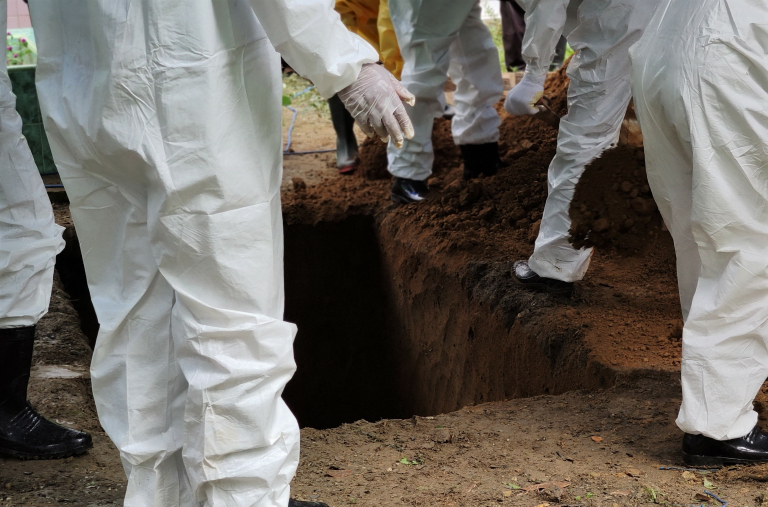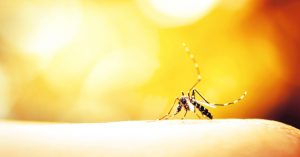Contact an undertaker to remove the body. You will have to let the undertaker know that your loved had COVID-19 so that they can ensure everyone’s safety. Once the undertaker has taken their body, wash your loved ones bed linens and remaining clothing items at a high temperature, and wipe down all surfaces and possessions with sanitiser, bleach or disinfectant. Remember to wear gloves and a mask while doing this.
Wrapping of the corpse with plastic is not required for infection control, as there is no evidence of transmission of COVID-19 from a corpse. WHO recommends the use of body bags to transfer the corpse from the hospital bed to the mortuary or funeral parlour for preparation. This is to avoid exposure to body fluids. If there are no signs of fluid leak, a shroud is acceptable.
Wrapping of the coffin with plastic or any other material is not required for infection control.
There is no evidence of transmission of COVID-19 from a corpse but it may be possible that you could get COVID-19 by touching the body of a deceased person. This is why it is important that those handling the body, whether healthcare workers or family, must wear appropriate personal protective equipment (gloves and masks).
There are many different cultural traditions involved in the bereavement process, including some that involve touching the deceased person’s body before preparation. Though we are still learning more about how COVID-19 spreads, it may be possible that you could get COVID-19 by touching the body of a deceased person who had confirmed or suspected COVID-19 prior to the body being prepared for viewing.
Take steps to protect yourself, such as:
- Avoid touching, hugging, or kissing the body of a deceased person who had confirmed or suspected COVID-19 before and during body preparation, especially if you or a member of your household are at higher risk of severe illness from COVID-19.
- Wash your hands with soap and water for at least 20 seconds after any contact with the body. If soap and water are not readily available, use a hand sanitizer that contains at least 60% alcohol.
If the deceased person had confirmed or suspected COVID-19, avoid kissing, washing, or shrouding the body before, during, and after the body has been prepared, if possible.
Take precautions if participating in these activities is part of important religious or cultural practices. Work with your cultural and religious leaders and funeral home staff to identify how to reduce exposure as much as possible.
If you work at a funeral home, you need to wear disposable gloves (nitrile, latex, or rubber). Additional protective equipment may also be required, such as disposable and waterproof isolation gowns, face shields or goggles, and facemasks (e.g., if splashing of fluids is expected). A surgical or medical mask should be worn, but a N95 respirator is not necessary, as virus particles are not aerosolised from deceased persons.
Following preparation of the body, safely remove gloves (and other protective equipment, if used) and throw them away. Immediately wash your hands with soap and water for at least 20 seconds. If soap and water are not available, use a hand sanitizer that contains at least 60% alcohol. Shower as soon as possible.
If desired, you may retrieve the belongings of a loved one who has died of COVID-19 outside their home (for example, in a hospital setting). Depending on local rules and regulations, family members may retrieve these belongings at the funeral home or the healthcare facility. You should use gloves and practice good hand hygiene when handling your loved ones’ belongings. If removing personal possessions (such as wedding rings) from the body or casket, clean and disinfect the items and wash hands right away.
- The regulations allow for only 50 people at most to attend the funeral, this is so that physical distancing is possible, and to contain any possible spread of the virus.
- When planning the service, meet and greet everyone outside.
- Ensure that all persons wear a cloth mask or a medical or surgical mask. Have additional masks in case persons arrive without masks.
- Avoid hugging or touching persons at the funeral service.
- No food or tea should be served, as when we eat we have to take off our masks
- Consider a venue that has windows and doors you can keep open so fresh air can circulate, and make provision for soap and sanitisers
The body can be viewed and face may be exposed during the funeral proceedings, provided that it is not possible to touch or hug the face. To prevent touching the corpse, a Perspex or similar cover over the exposed face should be used.





